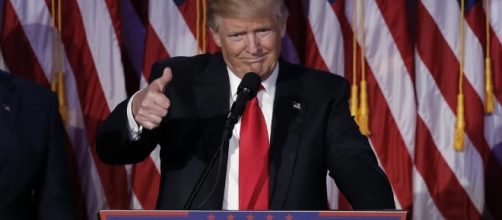The first 100 days at the helm of US President Donald Trump has gone awry. He showed that he could change his tone and stance, but he still fails to create a clearly articulated policy and develop a presidential style.
The man who promised the Americans to "win, win, win" after the first 100 days in power, cannot boast with what he has achieved: the most unpopular president in contemporary US history at the beginning of his mandate (although his base, for now, remains faithful).
Political shock
The 70-year-old Trump, whose election caused a political shock all over the world, is still impulsive, instinctive and unpredictable.
But the former anti-constituency candidate, who promised to shake Washington, "to drain this swamp," also admits with a mixture of naïveness and cunning, that he understands that he has a tough job.
In just a few weeks he faced heavy blows from the Congress who refused his executive decree on migrants and the proposal for health insurance reform.
"No one knew the health system was so complex," he said on the occasion of a failed attempt to reform Obamacare, the key law of his democratic predecessor.
"After listening to ten minutes, I realized that it was not so easy," he said about the North Korean issue after meeting with Chinese President Xi Jinping. Duties in the Oval Office, in which each word is important, have proven to be significantly different from the pre-election campaign stage.
All his predecessors said: 'entering the White House at Avenue of Pennsylvania 1600 changes the perspective.'
"There is something specific to just the office of a president, which no one can avoid - you may think one when you go in, but the pressure behind that duty, the reality of the world around you, is different from what you have imagined," George W. Bush explained couple of days ago.
In addition to not giving up on uncontrolled morning communication via Twitter, mostly under the influence of Fox News, Donald Trump is evolving. In the election of his associates as well as in some decisions, he begins to define himself as a president.
Taking the lead of the first world power without any political, diplomatic or military experience, he defends that approach.
"I change, I am flexible, I'm proud of that," he said before he used air strikes on the Syrian regime for charges of using a chemical weapon against civilians, including children.
When it comes to China, Russia or NATO, his actions calmed part of the country as well as American allies. "Recent tugs of revolts should be (cautiously) greeted," he said in the Washington Post editorial, recalling the discomfort he had caused by his unusually aggressive inaugural speech. But this approach also has its risks.
Many examples show that Donald Trump is a unique president in American history. In the interview for the Time magazine in March, he defended all his controversial statements: "What can I say to you?
I tend to be right."
More than three months after taking the office, many critics still believe author Philip Roth's portrait of Trump. The portrait of a president who "knows nothing about the rules, history, science, philosophy, art, is unable to express or recognize the nuances" and who uses the "77-word dictionary".
Disagreement with the media
After 100 days in power, US President Donald Trump continues to publicly attack the media, and his electorates approve of that, but, paradoxically, it helps the media as well. Information television channels have a record-breaking audience, while many daily newspapers attracted thousands of new subscribers since he came to power.
"Trump is pure gold for traditional media," says Tobe Berkovitz, a former political consultant and now a professor at Boston University.
Dan Kennedy, professor of journalism at Northeastern University in Boston, believes that these psychodramas between Trump and the media are actually a kind of reality show. The new episode will be Trump's public show on Saturday in Pennsylvania on the day that the traditional annual dinner with White House correspondents is held, which the president has decided to avoid.

